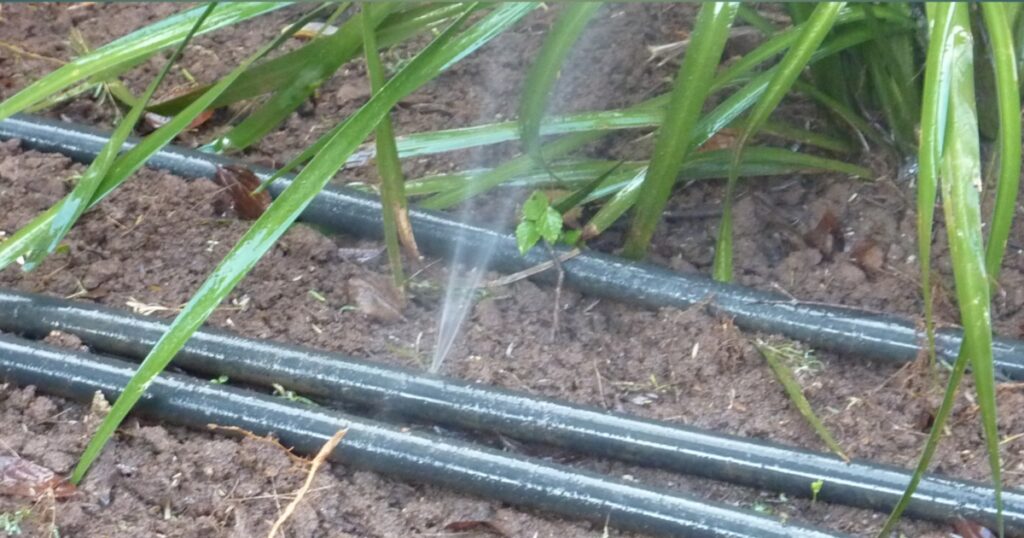Drip irrigation is a low volume, a low-pressure irrigation system that uses emitters to distribute water to your outdoor’s more delicate areas evenly. It is best for watering vegetable gardens, planting beds, and annual containers. Consider the benefits of drip irrigation if you are looking for a better way of irrigation.
Benefits Of Drip Irrigation System
While drip irrigation is not installed underground, it can be easily hidden beneath a layer of mulch or sit on top of it, allowing the plants to conceal it as they grow and spread. Drip emitters can even be routed to a garden box, hanging basket, or annual container to do their job while remaining out of the way. In addition to being discrete, Drip irrigation works exceptionally well because it waters only the area you need and only to the extent that you need it to. The flow rate can be adjusted to meet the needs of the plant being watered. Your plants will grow fuller and faster if you use the proper amount of water.

Reduced Water Usage
Water is not wasted on areas that will not benefit the plant by directly targeting the root zone.
Healthier Foliage
Overhead watering causes the plant’s leaves to remain wet for an extended period of time after irrigating. Wet leaves cause discoloration and spots. Drip irrigation keeps the plant’s leaves dry.
Prevents Fungus
Wet leaves can lead to the spread of the fungus, such as powdery mildew. Drip irrigation keeps the foliage dry and prevents fungus.
Prevents Soil Erosion
Drip irrigation is a gentle, steady drip that reduces runoff and, as a result, soil erosion.
Reduces Weeds
Weeds are less likely to grow in areas between the plants because they will not receive water.
Nutrient Runoff Minimized
When a large amount of water runs off the soil’s surface, it depletes the soil’s nutrients. Because drip irrigation reduces runoff, it reduces nutrient loss.
Works With Low Pressure
Low pressure is actually beneficial for drip irrigation. However, if there are a lot of sprinkler heads, most overhead irrigation systems necessitate the use of pressure tanks.
Appearance.
If you are concerned about the appearance of a drip irrigation system, a layer of organic mulch can easily hide the tubes.
Time-Saving
Installing a drip system will save you not only water but also time.
? Get rid of hours of hand-watering.
? A timer allows for complete automation.
? Weeding is reduced or eliminated.
Money-Saving
Drip irrigation systems are designed to deliver water directly to the plant’s roots.
? Drip irrigation uses 30 to 50% less water.
? You can make back the cost of the system in one to two seasons.
? Your utility (water) bill will be lower with less water loss due to evaporation.
? With proper planning, drip irrigation components can last for many years.
Versatility
Drip irrigation systems can be installed almost anywhere.
? Gardens, vineyards, greenhouses, and row crops.
? Existing or newly created landscapes
? Hillsides or flat land
? Long-Lasting and adaptability
? A fertilizer injector can be used to feed fertilizer to the plants while the system is running.
Plant Health
Drip irrigation directs water to the roots of plants rather than the leaves.
? It helps in the prevention of mildew on leaves.
? Diseases that can grow and spread on wet leaves are reduced.
? Reduces water droplet evaporation in the air
Simple design
Drip irrigation is simple to install and use. Irrigation installation companies provide all of the necessary components, such as a pressure regulator, garden hose fittings, and a drip line. Moreover, the professionals who mount the items to your hose spigot work quickly to deliver a fully functional system in no time.
Environmental benefits
Drip irrigation installed by homeowners can help protect the environment. The system is so effective that the risk of erosion is significantly reduced. As a result, only a small amount of runoff ends up in nearby rivers and streams.
Improves Growth
Smaller amounts of water applied over a more extended period of time result in ideal growing conditions. Drip irrigation prolongs plant watering times while preventing soil erosion and nutrient runoff. Additionally, water penetrates deeply into the soil because the flow is continuous, reaching the root zone.
Adaptable
A drip irrigation system is simple to modify to meet the changing needs of a garden or lawn.
Final Words
Drip irrigation is a type of irrigation system that emits small drops of water directly to the plant’s root zone.
The list of advantages that drip irrigation provides homeowners is endless. Aside from the abovementioned factors, its gentle touch means that drip-irrigated areas will experience minimal erosion and runoff. It also eliminates the need for homeowners to hand-water every aspect of their landscape. With a drip irrigation system installed, homeowners will no longer have to worry about their plants and gardens when their lives become hectic, or they go out of town, and they will no longer have to climb a ladder to reach out of the way of plantings.

As the editor of the blog, She curate insightful content that sparks curiosity and fosters learning. With a passion for storytelling and a keen eye for detail, she strive to bring diverse perspectives and engaging narratives to readers, ensuring every piece informs, inspires, and enriches.









